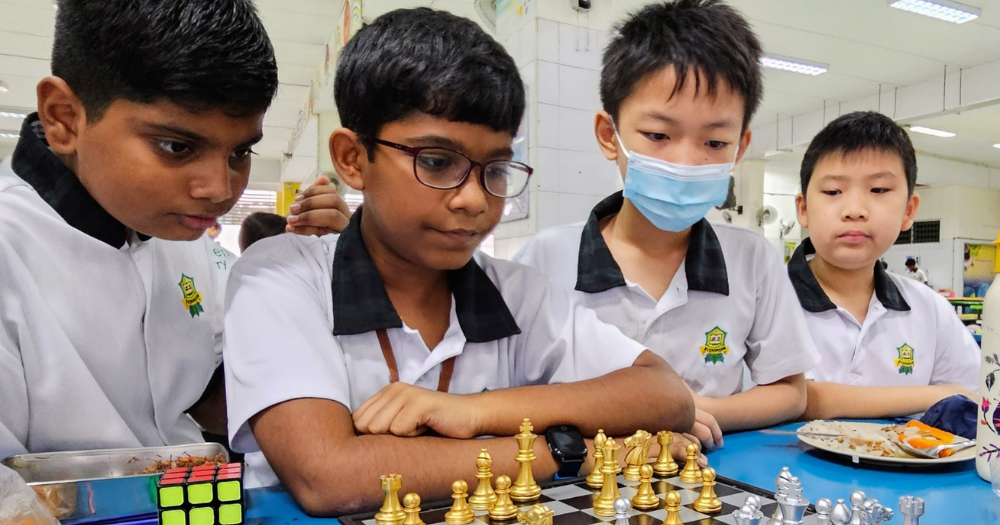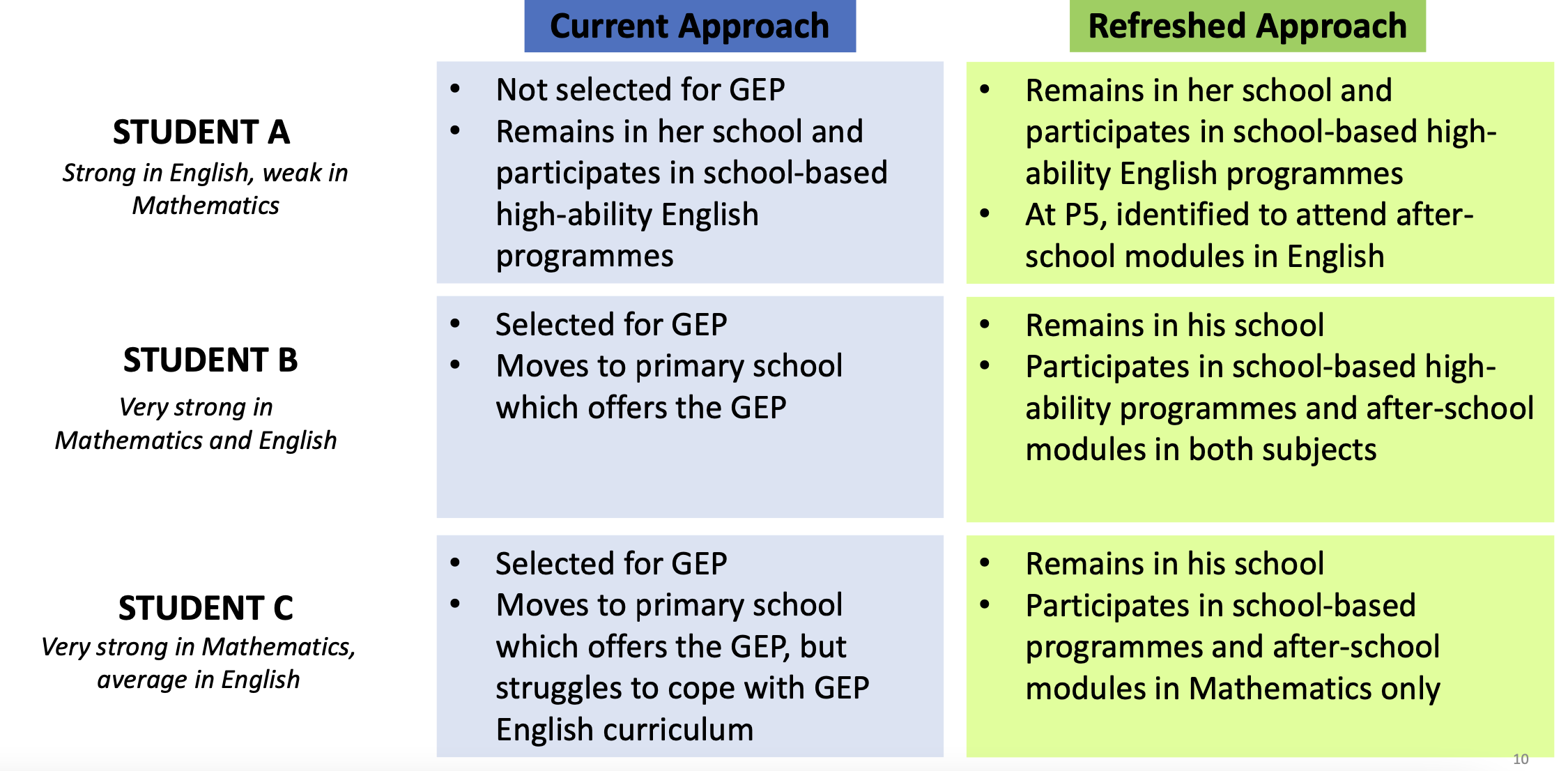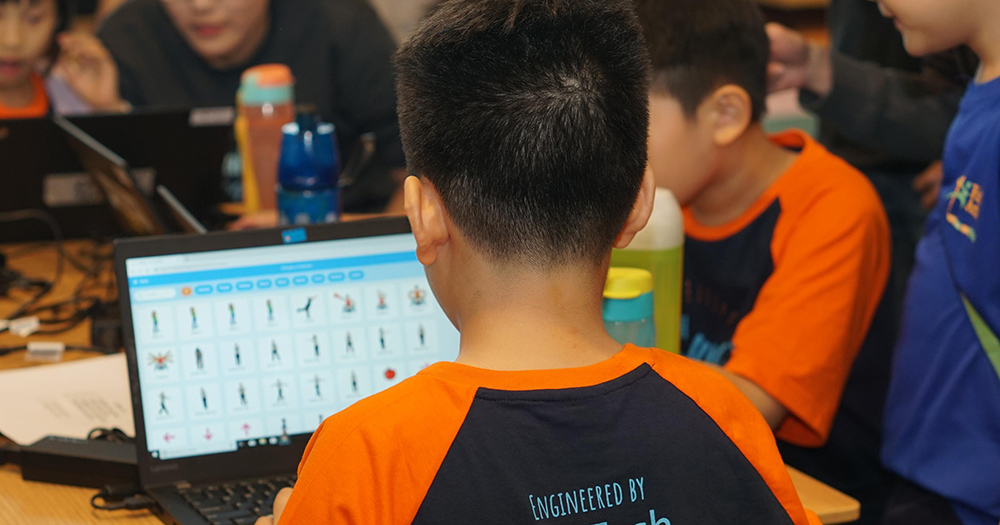GEP revamp with 2024 Primary 1 cohort, 10% of students to get access to high-ability programmes
This is up from 7 per cent currently, according to MOE.

More details have been shared on how the Gifted Education Programme (GEP) will be updated in Singapore.
This follows an announcement made by Prime Minister Lawrence Wong during his National Day Rally speech on Aug. 18.
"We will discontinue the current form of the GEP in primary schools.
We will replace it with a new approach to stretch students with higher abilities across all our primary schools."
In an Aug. 19 release, the Ministry of Education (MOE) stated that the changes to the GEP will apply from the 2024 Primary 1 cohort.
What does GEP look like now?
The GEP, introduced in 1984, seeks to nurture intellectually gifted students in Singapore.
Currently, around 1 per cent of each cohort is selected for the GEP, through a two-stage screening exercise in Primary 3.
They study at one of nine primary schools offering the programme from Primary 4 to 6.
GEP students study a centrally planned enriched curriculum for English, Mathematics and Science which covers the same content areas as that of mainstream students, but extended in breadth and depth.
They also learn skills for independent inquiry and are encouraged to explore self-selected areas of interest.
From end-2008, MOE discontinued the secondary school version of GEP, as six-year integrated programmes became more popular.
From 2007, MOE also has existing provisions for all primary schools to provide enrichment programmes and activities for higher-ability learners in English, Mathematics and Science.
Organised by the Gifted Education Branch (GEB), these include creative writing sessions and math and science enrichment programmes typically held outside of curriculum hours.
What are the changes?
The current GEP system will be discontinued in favour of school-based programmes for higher-ability learners to develop them in their areas of strength and interests.
Students will remain in their own schools for these programmes, and will not need to transfer at Primary 4 to a GEP school.
Students who can benefit from further development will also be offered the choice to attend after-school modules at designated nearby schools.
These modules will be different from the academic curriculum in schools, as they are designed to “cultivate curiosity and a love for learning”.
Students who go for these after-school modules will learn alongside students of similar abilities and interests from other schools.
Since these modules cater to students with specific strengths, more students can take them, compared to the current GEP cohort.
Primary 3 students will continue to sit for the first stage of the standardised GEP selection test, which assesses their English and Mathematics capabilities, to help schools identify such learners.
There will no longer be a second selection test.
Schools can also identify high-ability learners using a more holistic process, including day-to-day observations, teacher recommendations and students’ work.
Students can be identified to join these programmes at multiple junctures from Primary 4 to 6.
Students who take up such programmes will have the flexibility of opting out at a later date.
Current Primary 2 and 3 students will still go through the existing GEP model.
The Primary 4 cohort in 2027 will be the first to experience the updated model.
Why the changes?
MOE indicated two findings from international research that informed their change to the GEP model.
"While the GEP has generally benefited these students, international research has increasingly shown that intelligence and ability are developed over the course of an individual’s life, and can manifest in specific areas (e.g., only in English or Mathematics) or in several areas."
It said that under the new model, students who are very strong in some subjects but weaker in others will benefit, versus the current "one size fits all" GEP model which covers all three subjects.
One example raised is a student who is strong in English but weak in Mathematics, who would not be selected under the current GEP model but under the new model could be selected to participate in school-based high-ability English programmes to improve on their strengths.
 Image from MOE.
Image from MOE.
MOE noted in a media briefing that some students may be early bloomers while others may bloom later.
“We don’t want to be just focusing on the P3 selection test for GEP as a single time window to actually identify students with certain intellectual boosts", the ministry said.
Another benefit cited by MOE is the support for higher-ability students while they remain in their own schools.
"They will continue learning with friends they have made in lower primary, while still being sufficiently nurtured in their schools."
MOE added that the emphasis for future programmes is on sparking the joy of learning in students, rather than intellectual breadth and depth.
10 per cent of cohort can benefit from such programmes: Chan Chun Sing
The government would not have been able to make these changes in the early years of the GEP because MOE has been building up its capacity over the years, said Minister for Education Chan Chun Sing.
He noted that 10 per cent of the cohort, or about 3,000 students across 180 primary schools will be able to join such school-based programmes for high-ability learners.
This is up from 7 per cent today, according to MOE.
Every school will have about 15 such students — although some may have more while others may have fewer, Chan said.
Chan pointed out that developing children holistically is not just about their academic abilities, but also their social and emotional development.
He said this requires a stable environment, and not disrupting the friendships and bonds they have built up in their early school years, which is why the programmes have been designed so that students can complete them while remaining in their schools.
There's no need to hothouse your children: Chan Chun Sing
Chan also noted that the new model would take the emphasis off the P3 selection test as a single window for recognising children's abilities.
"In the new system, you will have many opportunities to demonstrate your abilities from P3 onwards. You can join the program in P3 or subsequently from P3 so there's no need to hothouse or overly prepare just because you think that there's a single window."
Chan commented on the negatives of parents "hothousing" or preparing their children through private classes prior to the GEP selection test.
"My first message to all parents is this, I think we must know the downsides of hothousing any child, and if we now understand that actually there are multiple points of entry. There's no need for us to hothouse our children, and if anything, you will do the child more harm than good."
Instead, he advised parents to pace themselves and let their children develop at a natural rate, which would be beneficial for their long-term development.
Final selection for current form of GEP in 2025
The final selection exercise for the GEP in its current form will be held for Primary 3 students in 2025.
The last intake of Primary 4 students into one of the nine primary schools that run the GEP will happen in 2026.
Top image from Ministry of Education / Facebook

MORE STORIES




















